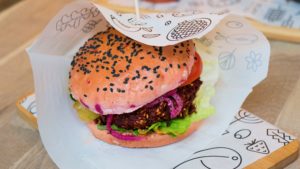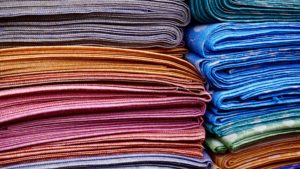One of the biggest trends today is the use of “alternative” goods in lieu of everyday, commonly used ingredients and materials. More and more consumers are looking to buy beef that isn’t made of meat, flour that isn’t made of wheat, and dairy that doesn’t come from cows. What is compelling modern shoppers to change their buying habits and purchase something meant to imitate a product already in existence?
The rising popularity of alternative goods is typically due to perceived health benefits, reduced environmental impact, and/or more ethical consumption. While alternative goods are leaving their biggest mark on the food industry, the apparel industry also sees its fair share of alternative materials as consumers become more interested in sustainability and social responsibility.
Here are some of the biggest “alternative” trends in the market today.
Alternative protein
 Plant-based meat substitutes have taken off in recent years. As consumers become more aware of the environmental impact of the livestock industry, they are seeking more ethical and sustainable alternatives. Beyond Meat claims that their “Beyond Burger” uses 99% less water, 93% less land, 46% less energy, and generates 90% fewer greenhouse gas emissions than a ¼ US beef burger. Competitor Impossible Foods boasts similar numbers. Both companies ground their mission on the tenets of “saving the planet” and significantly changing the way society thinks about and consumes meat—and consumers are responding positively.
Plant-based meat substitutes have taken off in recent years. As consumers become more aware of the environmental impact of the livestock industry, they are seeking more ethical and sustainable alternatives. Beyond Meat claims that their “Beyond Burger” uses 99% less water, 93% less land, 46% less energy, and generates 90% fewer greenhouse gas emissions than a ¼ US beef burger. Competitor Impossible Foods boasts similar numbers. Both companies ground their mission on the tenets of “saving the planet” and significantly changing the way society thinks about and consumes meat—and consumers are responding positively.
According to CNBC, the global meat substitutes market generated revenue of $4.2 billion in 2018, and is expected to be worth $6.1 billion by 2023. Clearly, today’s consumers have embraced alternative proteins as part of a new lifestyle.
Want to learn more? Read more about alternative proteins in our blog
Alternative dairy
 In a similar vein, many consumers are also turning to plant-based “milk” alternatives, which are commonly made from soy, almond, coconut, or oat. Products traditionally made with dairy, such as yogurt and ice cream, are also being offered as non-dairy versions. According to a 2018 survey, consumer purchases of alternative dairy products are primarily driven by flavor (48%), but also by perceived health benefits (36%), price (37%), and ingredient source (33%).
In a similar vein, many consumers are also turning to plant-based “milk” alternatives, which are commonly made from soy, almond, coconut, or oat. Products traditionally made with dairy, such as yogurt and ice cream, are also being offered as non-dairy versions. According to a 2018 survey, consumer purchases of alternative dairy products are primarily driven by flavor (48%), but also by perceived health benefits (36%), price (37%), and ingredient source (33%).
Whatever the reason, alternative dairy products have a strong and growing presence in the market. According to recent research, sales of plant-based yogurt alternatives in the United States have grown by 36% since 2018, compared to a 1.4% decline for yogurt. In addition, US sales of plant-based ice cream alternatives have increased by 0.8% since 2018, with the three-year compound annual growth rate after 2015 at 47%.
Alternative fiber
 Food is not the only industry affected by the growing demand for alternative goods. As more consumers become conscious of the origins of their clothing, they are seeking apparel made with more sustainable fibers.
Food is not the only industry affected by the growing demand for alternative goods. As more consumers become conscious of the origins of their clothing, they are seeking apparel made with more sustainable fibers.
Much of the clothing produced today is made of plastic-based synthetic fabrics such as polyester, nylon, and acrylic. While these fabrics are durable and affordable, they also release hundreds or thousands of microfibers when being washed. Microfibers can be toxic to wildlife and are often ingested by marine wildlife, which then make their way into the food chain. The environmental impact of plastic-based fabrics has led consumers to seek out alternatives that are less damaging to the planet.
Fibers such as viscose, rayon, lyocell, modal are becoming popular as “sustainable” alternatives to synthetics. These fabrics are derived from wood and are therefore plant-based, but they still undergo chemical processing, making them semi-synthetic. Regardless, these alternative fibers are touted as better for the environment due to their plant-based origins, while still being easily treated for consumer-friendly qualities such as anti-wrinkling, waterproofing, and stain resistance.
However, because these alternative fibers are made from wood, deforestation, in addition to the chemically intensive processes required to manufacture these fabrics, are still cause for concern for some consumers. As a result, alternative fibers have not yet reached the same level of popularity as alternative protein and dairy.
What does this mean for businesses?
While alternative goods directly appeal to consumer interest in sustainability and social responsibility, companies offering such goods must still take the necessary steps to ensure their supply chains comply with regulations and meet consumer demands for responsible products.
If businesses do not support CSR and sustainability claims with real data, they risk accusations of greenwashing and loss of credibility. Companies should verify that the supply chains behind alternative goods meet the same rigorous standards as those for any other product. While the latest plant-based protein or lyocell fiber may be better for the planet, responsible sourcing begins with supply chain transparency and compliance.
Transparency-One provides a complete platform to transform the way businesses manage their supply chains. We help companies trace their products, increase supplier engagement, and ensure compliant, responsible sourcing. This leads to safer facilities, more sustainable and ethical products, reduced risks, and greater visibility.









